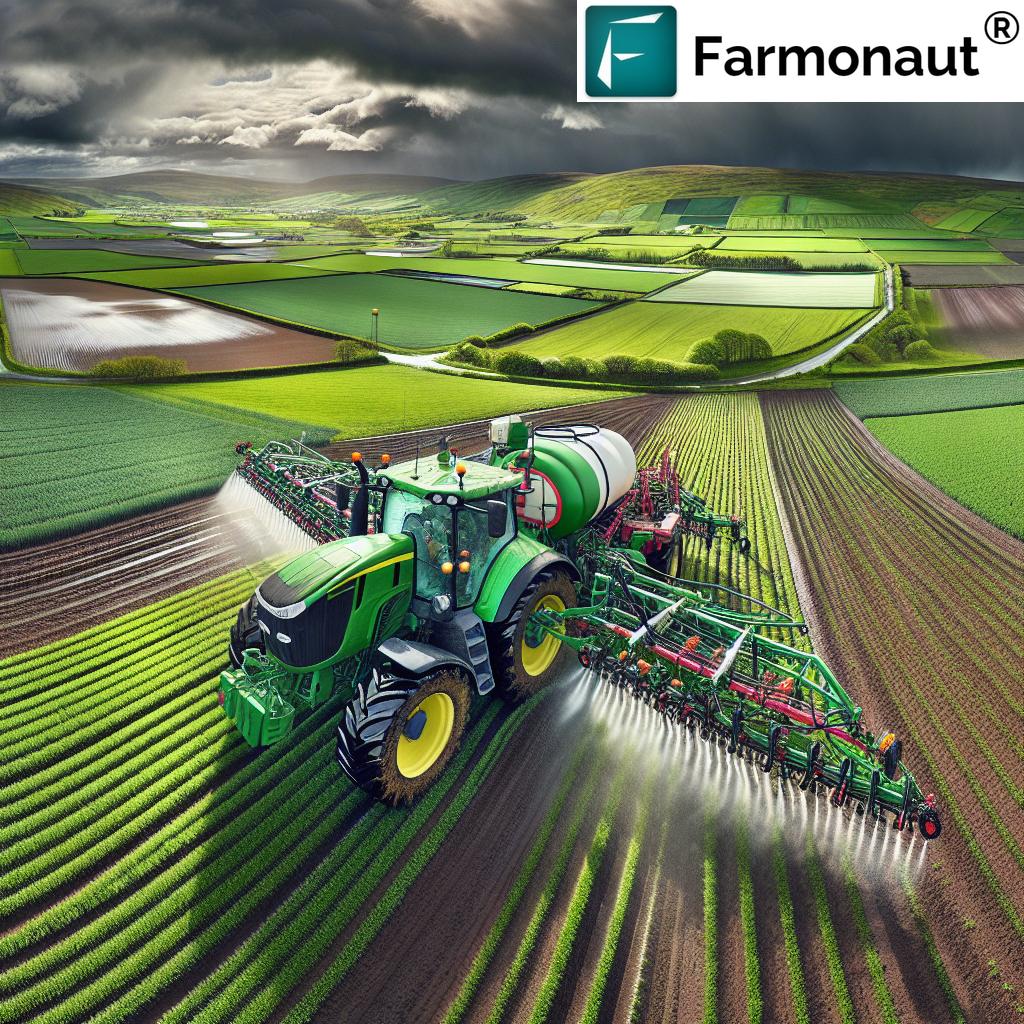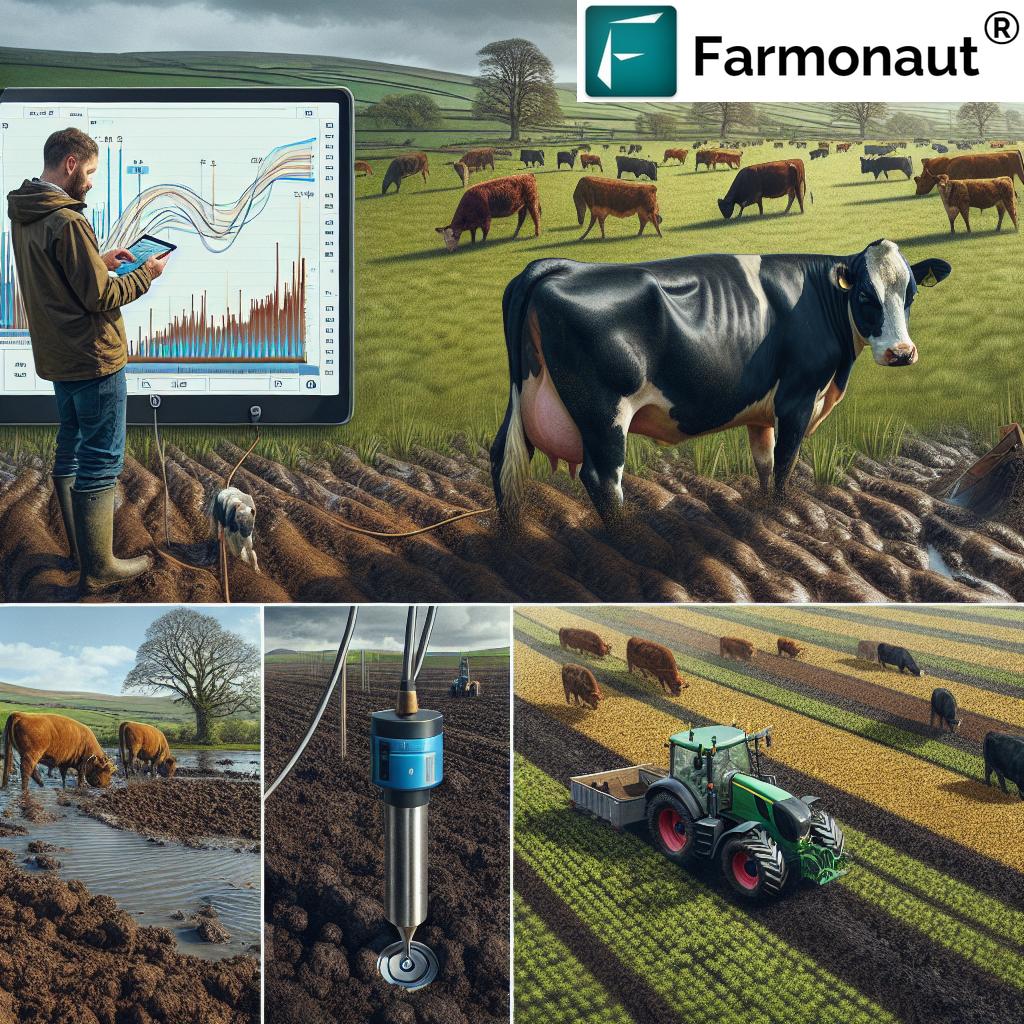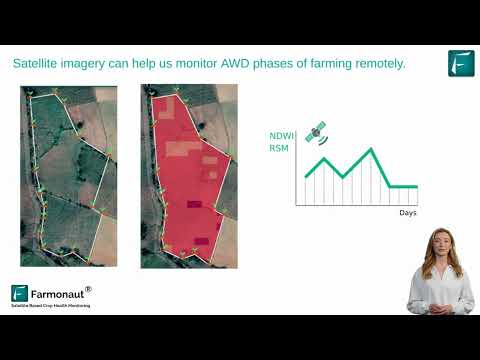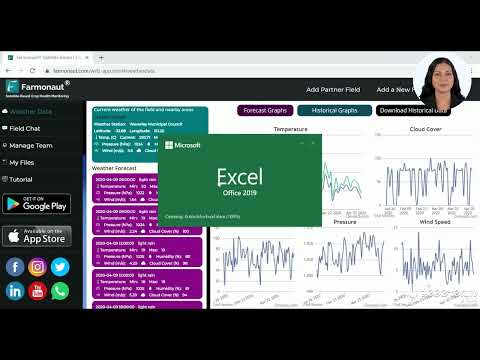Adapting Farm Management: Innovative Strategies for Wet Weather Challenges in England, Wales, and Scotland
“Over 60% of farmers in England, Wales, and Scotland have reported significant challenges due to recent wet weather conditions.”
As we navigate the ever-changing landscape of agriculture in England, Wales, and Scotland, we find ourselves facing unprecedented challenges due to persistent wet weather conditions. Our farms, be they arable or livestock-focused, are experiencing the brunt of these climatic shifts. However, in the face of adversity, we’ve discovered that innovation and adaptation are key to maintaining productivity and ensuring the longevity of our agricultural systems.
In this comprehensive guide, we’ll explore cutting-edge farm management strategies designed to help farmers across the United Kingdom tackle the unique challenges posed by excessive rainfall. From advanced agricultural technology solutions to wet weather farming techniques, we’ll delve into a range of topics that are crucial for modern farm management in these demanding conditions.
Understanding the Impact of Wet Weather on Farming
Before we dive into solutions, it’s essential to understand the full scope of challenges that wet weather brings to our farms:
- Soil Health Deterioration: Excessive moisture can lead to soil compaction, nutrient leaching, and reduced microbial activity.
- Delayed Planting and Harvesting: Waterlogged fields can significantly disrupt crop schedules.
- Increased Disease Pressure: Damp conditions create an ideal environment for fungal diseases and certain pests.
- Livestock Management Challenges: Wet pastures can lead to poaching, reduced grazing opportunities, and increased risk of certain parasites.
- Equipment Limitations: Heavy machinery can damage saturated soils, limiting field operations.
Now, let’s explore how we can address these challenges with innovative farm management strategies.
Innovative Soil Health Management in Wet Conditions
Maintaining soil health is paramount in wet weather conditions. Here are some advanced techniques we can employ:
- Precision Drainage Systems: Implement smart drainage solutions that can be controlled remotely, allowing for better water management.
- Cover Cropping: Utilize cover crops that can withstand wet conditions to protect soil structure and prevent erosion.
- Biochar Application: Incorporate biochar to improve soil structure, increase water retention capacity, and enhance microbial activity.
- Reduced Tillage Practices: Adopt minimum or no-till farming to maintain soil structure and reduce compaction risks.
Farmonaut’s satellite-based crop health monitoring can be invaluable in assessing soil moisture levels and vegetation health, helping us make informed decisions about soil management practices.

Advanced Spring Grazing Management Techniques
Wet conditions can wreak havoc on spring grazing plans. Here are some innovative approaches to manage this challenge:
- Rotational Grazing with GPS Tracking: Implement a tech-driven rotational grazing system to prevent overgrazing and soil damage.
- Raised Feeding Areas: Create elevated feeding zones to reduce poaching in heavily trafficked areas.
- Virtual Fencing: Utilize GPS-enabled collars to create flexible, movable grazing boundaries without physical fences.
- Hydroponic Fodder Systems: Supplement grazing with indoor-grown hydroponic fodder during periods of limited pasture access.
Farmonaut’s precision agriculture tools can assist in monitoring pasture health and growth rates, enabling data-driven decisions in grazing management.
Innovative Crop Rotation Planning for Wet Climates
Adapting our crop rotation strategies is crucial in managing wet weather challenges:
- Water-Tolerant Crop Varieties: Incorporate crops bred specifically for tolerance to waterlogged conditions.
- Diversified Rotation: Include a mix of deep-rooted and shallow-rooted crops to improve soil structure at various depths.
- Winter Cover Crops: Implement winter-hardy cover crops to protect soil during the wettest months.
- Intercropping Systems: Utilize companion planting techniques to maximize land use and soil protection.
Farmonaut’s AI-driven advisory system, Jeevn AI, can provide personalized recommendations for crop rotation based on local weather patterns and soil conditions.
Precision Agriculture for Livestock Management
Livestock farming faces unique challenges in wet conditions. Here’s how precision agriculture can help:
- Smart Health Monitoring: Utilize wearable devices to track animal health and detect early signs of wet weather-related illnesses.
- Automated Feeding Systems: Implement weather-responsive feeding systems that adjust rations based on environmental conditions.
- Thermal Imaging for Lambing/Calving: Use thermal cameras to monitor newborn livestock in cold, wet conditions.
- Precision Parasite Management: Employ data-driven approaches to predict and manage parasite risks exacerbated by wet weather.
Farmonaut’s platform can integrate with these systems, providing a comprehensive view of farm operations and enabling swift responses to changing conditions.
“Implementing precision agriculture techniques can increase farm productivity by up to 25% in waterlogged soil conditions.”
Sustainable Farming Practices for Wet Weather Resilience
Sustainability is key to long-term success in challenging weather conditions:
- Agroforestry Integration: Incorporate trees and shrubs to improve drainage and provide shelter for livestock.
- Wetland Creation: Develop managed wetland areas to act as natural water reservoirs and wildlife habitats.
- Renewable Energy Systems: Invest in weather-resistant renewable energy sources like solar and wind to ensure continuous power supply.
- Water Harvesting: Implement systems to capture and store excess rainwater for use during drier periods.
Farmonaut’s carbon footprinting feature can help track the environmental impact of these practices, ensuring we’re moving towards more sustainable farming methods.

Advanced Equipment Management in Wet Conditions
Adapting our machinery use is crucial in wet weather farming:
- GPS-Guided Machinery: Utilize precision guidance systems to minimize soil compaction and optimize field operations.
- Tracks over Wheels: Convert tractors and heavy machinery to track systems for better weight distribution.
- Drone Technology: Employ drones for crop spraying and monitoring, reducing the need for heavy machinery in fields.
- Smart Sprayers and Spreaders: Implement variable-rate technology to ensure precise application of inputs, even in challenging conditions.
Farmonaut’s fleet and resource management tools can help optimize the use of farm equipment, ensuring efficient operations while minimizing soil damage.
Innovative Grassland Management Strategies
Maintaining productive grasslands in wet conditions requires innovative approaches:
- Multi-Species Swards: Implement diverse grass and herb mixes for improved resilience and soil structure.
- Precision Reseeding: Use data-driven decision-making for targeted reseeding of damaged areas.
- Smart Irrigation Systems: Install weather-responsive irrigation systems to manage water levels effectively.
- Drone-Based Pasture Assessment: Utilize drone technology for regular assessment of pasture quality and growth rates.
Farmonaut’s satellite-based monitoring can provide valuable insights into grassland health, helping farmers make informed management decisions.
Agricultural Weather Adaptation Techniques
Adapting to changing weather patterns is crucial for modern farming:
- Microclimate Monitoring: Install a network of weather stations across the farm to capture localized weather data.
- Predictive Modeling: Utilize AI-driven weather prediction models to inform farm management decisions.
- Climate-Controlled Structures: Invest in advanced greenhouses and livestock housing with precise climate control.
- Water Management Systems: Implement smart water management systems that can quickly adapt to changing rainfall patterns.
Farmonaut’s weather data integration can provide farmers with accurate, localized weather forecasts, enabling proactive farm management.
Innovative Strategies for Sheep and Cattle Welfare in Wet Conditions
Ensuring the well-being of livestock in wet weather requires specialized approaches:
- Elevated Sleeping Areas: Create raised, well-drained resting zones to keep animals dry.
- Smart Ventilation Systems: Install humidity-responsive ventilation in barns to maintain optimal air quality.
- Automated Health Checks: Implement AI-powered systems for early detection of wet weather-related health issues.
- Nutritional Adjustments: Utilize precision feeding systems to adjust rations based on increased energy needs in wet conditions.
Farmonaut’s precision agriculture tools can assist in monitoring animal welfare indicators, enabling timely interventions when needed.
Leveraging Farmonaut’s Technology for Wet Weather Farming
Farmonaut’s advanced agricultural technology solutions offer valuable support for farmers dealing with wet weather challenges:
- Real-Time Crop Health Monitoring: Utilize satellite imagery to assess crop health and identify areas affected by waterlogging.
- AI-Powered Advisory: Receive personalized recommendations for crop management based on current weather conditions and forecasts.
- Resource Optimization: Use Farmonaut’s fleet and resource management tools to efficiently allocate machinery and labor in challenging conditions.
- Data-Driven Decision Making: Access comprehensive farm data through Farmonaut’s platform to make informed management decisions.
To explore how Farmonaut can support your farm management strategies, visit our web application or download our mobile apps:
For developers interested in integrating Farmonaut’s capabilities into their own systems, check out our API and API Developer Docs.
Comparative Analysis: Traditional vs. Innovative Wet Weather Farm Management Strategies
| Farm Management Area | Traditional Approach | Innovative Strategy | Estimated Impact on Productivity (%) | Farmonaut Technology Application |
|---|---|---|---|---|
| Soil Health Management | Basic drainage systems, limited soil testing | Precision drainage, biochar application, reduced tillage | +15-20% | Satellite-based soil moisture monitoring |
| Spring Grazing Techniques | Set stocking, manual pasture rotation | GPS-guided rotational grazing, virtual fencing | +10-15% | Pasture health assessment via satellite imagery |
| Crop Rotation Planning | Fixed rotation cycles, limited crop variety | Adaptive rotation with water-tolerant varieties, intercropping | +20-25% | AI-driven crop rotation recommendations |
| Grassland Management | Uniform reseeding, basic species mix | Precision reseeding, multi-species swards | +15-20% | Satellite-based grassland health monitoring |
| Equipment Handling | Standard wheeled machinery, manual guidance | GPS-guided machinery, track systems, drone technology | +10-15% | Fleet management and optimization tools |
| Livestock Management | Basic shelter, manual health checks | Smart ventilation, automated health monitoring, precision feeding | +15-20% | Integration with livestock monitoring systems |
Conclusion: Embracing Innovation for Resilient Farming
As we navigate the challenges posed by wet weather conditions across England, Wales, and Scotland, it’s clear that adapting our farm management strategies is not just beneficial, but essential. By embracing innovative agricultural technologies and sustainable farming practices, we can significantly improve our resilience to adverse weather conditions.
From advanced soil health management techniques to precision livestock care, the strategies we’ve explored offer a pathway to maintaining and even enhancing farm productivity in the face of climatic challenges. The integration of Farmonaut’s cutting-edge satellite technology and data-driven insights provides an additional layer of support, enabling farmers to make informed decisions based on real-time information.
As we look to the future, it’s evident that the most successful farms will be those that can adapt quickly and efficiently to changing conditions. By leveraging the power of precision agriculture, sustainable practices, and innovative technologies, we can ensure that our farms not only survive but thrive in the face of wet weather challenges.
Remember, every farm is unique, and the best approach will always be one that is tailored to your specific circumstances. We encourage you to explore these innovative strategies, consult with agricultural experts, and consider how tools like Farmonaut can support your farm’s journey towards greater resilience and productivity.
Farmonaut Subscriptions
Frequently Asked Questions
Q: How can Farmonaut help me manage wet weather challenges on my farm?
A: Farmonaut provides real-time satellite imagery and AI-driven insights to help you monitor crop health, soil moisture levels, and weather patterns. This information enables you to make data-driven decisions about irrigation, crop management, and resource allocation, which is particularly valuable in wet conditions.
Q: Are Farmonaut’s services suitable for both small and large farms?
A: Yes, Farmonaut’s services are scalable and can be tailored to farms of all sizes. Whether you’re managing a small family farm or a large agricultural operation, our technology can provide valuable insights to improve your farm management strategies.
Q: How accurate is the satellite data provided by Farmonaut?
A: Farmonaut uses high-resolution satellite imagery and advanced AI algorithms to provide highly accurate data. However, it’s important to note that factors like cloud cover can affect image quality. We continuously work to improve our technology and provide the most reliable data possible.
Q: Can Farmonaut’s technology integrate with my existing farm management systems?
A: Yes, Farmonaut offers API access, allowing for integration with various farm management systems. This enables you to incorporate our satellite data and insights into your existing workflows seamlessly.
Q: How often is the satellite data updated?
A: The frequency of updates depends on the satellite coverage and your subscription plan. Typically, we provide updates every few days, but this can vary. For the most current information on data update frequency, please check our website or contact our support team.
Q: Does Farmonaut provide support for interpreting the data and insights?
A: Yes, we offer customer support to help you understand and utilize the data effectively. Additionally, our Jeevn AI advisory system provides personalized recommendations based on the data collected, making it easier for you to interpret and act on the insights provided.
By embracing these innovative strategies and leveraging advanced technologies like Farmonaut, farmers across England, Wales, and Scotland can build more resilient and productive agricultural systems, even in the face of challenging wet weather conditions. Let’s work together to ensure a sustainable and prosperous future for British agriculture.





